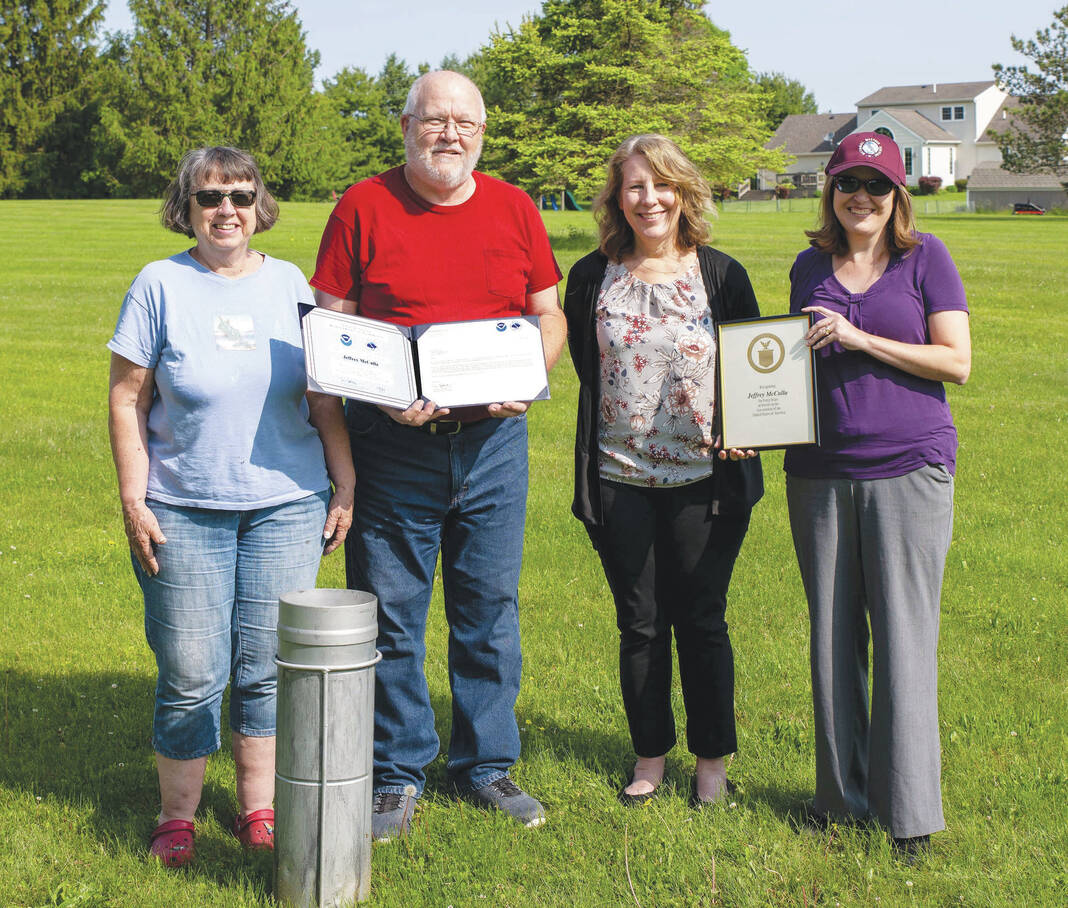
Pictured from left to right are Leta McCulla, Jeffrey McCulla, Julia Reed (service hydrologist) and Ashley Novak (meteorologist).
Photo by John Coffman Photography
By Katie Milligan
Contributing writer
ST. PARIS – On Monday morning, the National Weather Service (NWS) honored St. Paris resident Jeffrey McCulla for his 40 years of service as a precipitation observer in the NWS Cooperative Observer Program (Coop).
In attendance were Leta McCulla (Jeffrey’s wife) and several NWS employees: meteorologist Ashley Novak, service hydrologist Julia Dian-Reed and observing program leader James Gibson.
The NWS Coop program has been operating nationwide since it was established in Congress’s Organic Act of 1890. According to NWS’s official site, the coop’s two-fold mission is “to provide observational meteorological data, usually consisting of daily maximum and minimum temperatures, snowfall, and 24-hour precipitation totals, required to define the climate of the United States and to help measure long-term climate changes” and “to provide observational meteorological data in near real-time to support forecast, warning, and other public service programs of the NWS.”
As a whole, the coop program is responsible for selecting data sites, recruiting and training observers, installing and maintaining equipment (such as rain gauges), and collecting data and maintaining quality control of that data, among other items.
To open, Dian-Reed presented McCulla with a certificate on behalf of the Department of Commerce and the National Weather Service.
“Please accept this certificate as a small token of our appreciation for your outstanding record of public service. Your observations over the last 40 years prove your deep level of commitment to public service. They are a lasting and important contribution to the National Weather Service and to many others,” said Dian-Reed.
Currently, there is a network of over 8,700 volunteers recording observations in a variety of environments, including farms, cities, beaches, mountaintops, and National Parks. Each day, observers record temperature and precipitation amounts (and sometimes additional data, such as evaporation or soil temperatures) and send these figures electronically to the NWS and the National Climatic Data Center (NCDC).
“These reports become part of the climate history of the United States and help us understand and solve problems related to climate change, commerce, transportation, and agriculture,” said Dian-Reed.
Novak also presented McCulla with a pin, a hat, a flag, a signed card, and an additional framed certificate to commemorate the 40-year mark.
McCulla began his service by temporarily covering coop duties for elderly neighbors at his residence within the village of St. Paris, but when his neighbors could no longer serve, he took over the observer’s position full-time. Six years in, his family moved to a new residence, but as it was still close to downtown St. Paris, the NWS moved the gauge to the new property, and McCulla continued taking precipitation records for the next 34 years.
“He’s always been into weather. We’d always ask him, ‘Dad, is it going to rain today?’ and he’s usually right! He should have been a weatherman,” Leta said.
McCulla has had several memorable weather observations over the years. The first was measuring over eight and a half inches of rain in the flood of August 1995. He also remembers nearly golf-ball-sized hail in the hailstorm of 2001.
“I really appreciate being recognized. Obviously I don’t do this for money or any fame and glory, I just enjoy doing this,” said McCulla.
McCulla is in good company; even before the official establishment of the coop program in 1890, several observers were active, including John Campanius Holm (who recorded weather phenomena without the help of instruments in 1644-45), George Washington, Thomas Jefferson (who maintained a consistent weather record between 1776 and 1816), and Benjamin Franklin.
More recently, St. Paris’s surrounding communities have also celebrated lengthy records of NWS Coop service this year, with North Union’s observer being recognized for 45 years and Xenia’s observer achieving 50 years.
As the NWS website states, “Coop data plays a critical role in efforts to recognize and evaluate the extent of human impacts on climate from local to global scales.”
More information about the Cooperative Weather Observers Program can be found at https://www.weather.gov/coop/Overview.
Reach the writer at [email protected]

